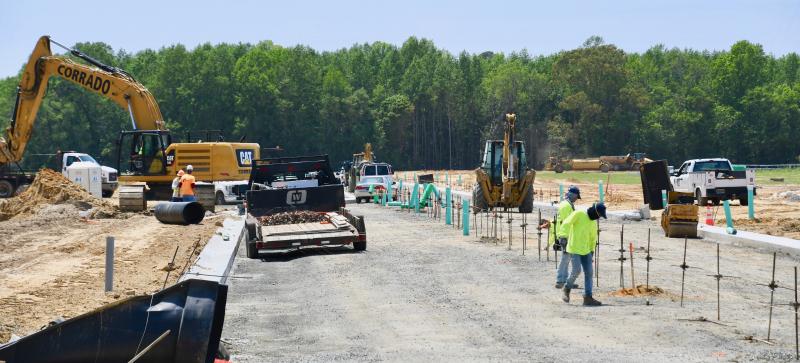Sussex council adopts $294.1 million budget

Sussex County has mapped out its finances for the year ahead, taking into account an unsettled economy.
County council, following a June 21 public hearing, voted to approve a $294.1 million budget for fiscal year 2023 that begins July 1.
The budget keeps county property taxes unchanged for another year, but does include various fee increases, as well as rate changes – $24 more annually for sewer, $35 additional yearly for water – for public utility users.
“Budgets are up anywhere you look, whether it’s in the board room or at the kitchen table. Everyone is feeling the pinch,” said Sussex County Administrator Todd Lawson. “Thankfully, the county has been able to adjust to the current economy, without raising property taxes and by keeping other costs to a minimum where possible. In the end, we have a reasonable, balanced plan that will carry us through the next year, and hopefully, to calmer economic waters ahead.”
The yearly plan is the second in a row for the county that nears $300 million, once again fueled largely by funding from the American Rescue Plan Act, as well as revenue generated by the housing market.
The overall budget is up by more than $16 million over last year's budget, but down slightly, approximately $1.6 million, when adjusted for amended expenses. Increased operational costs, continued economic uncertainty and more demand for public services are among the many factors driving the 2023 plan.
The budget is supported by a mix of income streams, including property taxes, realty transfer taxes, sewer service fees, building permit fees and document recording fees. That revenue funds many local services, including paramedics and 911 dispatchers, public wastewater treatment, building inspection and public libraries, among other benefits.
County Finance Director Gina Jennings said the budget is reflective of the current economic realities – namely growing demand for public services amid an era of record inflation – but remains consistent with the county’s long-held practice of conservative fiscal management.
Building trend continues
Building-related revenue continues to be a significant funding source for the county.
It is budgeted to increase 21%, or $2.5 million from last year, to $14.5 million in fiscal year 2023, compared to $12 million in 2022, but much lower than the record $19.6 million in 2019.
Realty transfer tax revenue has increased nearly $8 million this fiscal year and is budgeted at $32.8 million in fiscal year 2023. That's a drop from a record $58 million in fiscal 2021. The county has budgeted revenue of $15.9 million from property taxes.
Proceeds from the transfer tax continue to be the county's top revenue source, accounting for 38% of total revenue.
Reserves help balance budget
The budget includes $85.6 million in the general fund and $28.3 million in capital projects. It also includes $51.3 million in the sewer fund, $72.2 million for sewer and water capital projects, and $9.3 million in the pension fund.
Jennings said the county is seeing increases in nearly every cost category including employees, insurance, utilities and fuel. Realty transfer taxes totaling $30.4 million and $2 million in other reserve account funds are being used to balance the budget, Jennings said.
The general operating budget contains $37 million for public safety, which is nearly a third of the general fund budget.
Nearly 50%, or $10.2 million, of the county's grant-in-aid budget of $22.1 million goes to public safety, including $3.8 million for extra Delaware State Police troopers in the county, $69,000 for local law enforcement grants, and $5.6 million to county fire and ambulance services.
Budget highlights
Among the highlights in the budget:
• $72.2 million for wastewater infrastructure, including new sewer mains, increased treatment capacity, and other upgrades to the county’s utility systems
• $7.4 million to preserve open space and farmland that could otherwise be developed
• $7.3 million to pay for the final phase of construction of a consolidated public safety complex that will expand the Emergency Operations Center to accommodate the county’s Emergency Medical Services administrative offices and training facilities
• Increased funding, from $3.6 million to $3.8 million, for the county’s contract with the State of Delaware for supplemental state police troopers assigned to Sussex County
• $3.4 million to pay for the continuing court-ordered, countywide reassessment of all properties
• No change in current property tax rates, though there are a number of fee increases, including $24 annually for sewer and $35 annually for water for public utility customers, as well as new or adjusted fees for a variety of land-use services (change of zone, commercial site-plan review, subdivision and variance requests, etc.)
• $22.1 million in the grants-in-aid fund, with $10.2 million going to public safety
• County staff in fiscal year 2023 will total 562 employees, compared to 549 in 2009 and a low of 492 in 2014.
• $1.5 million for the construction of a new paramedic station in the Millsboro area
• $2.8 million – up $800,000 over the current year – for local volunteer fire companies with ambulance service to cover salaries for paid EMTs.
Copies of the budget, as well as the accompanying budget presentation, can be downloaded from the county website at sussexcountyde.gov/county-budget.
























































